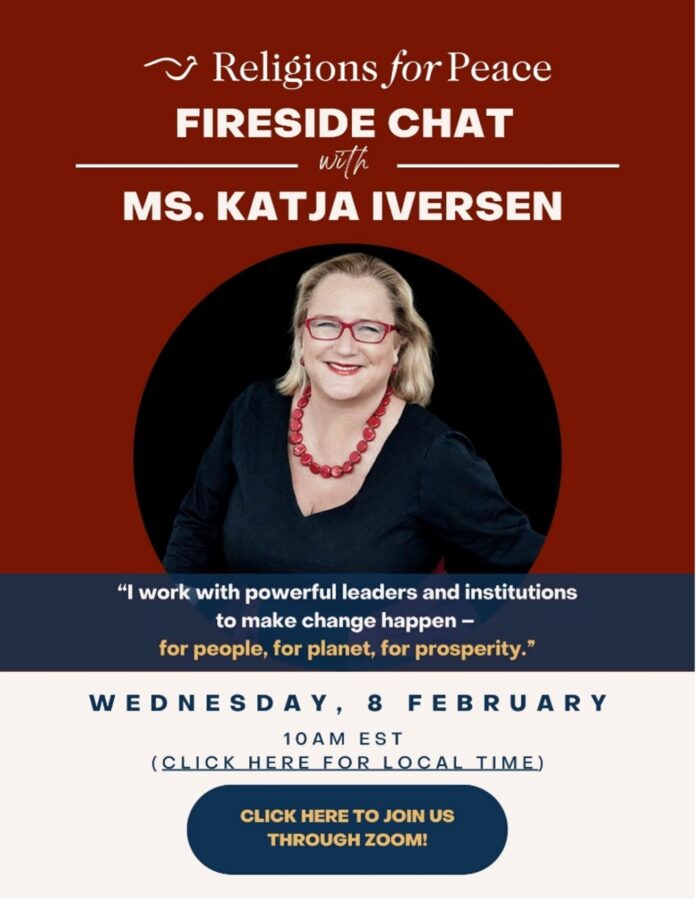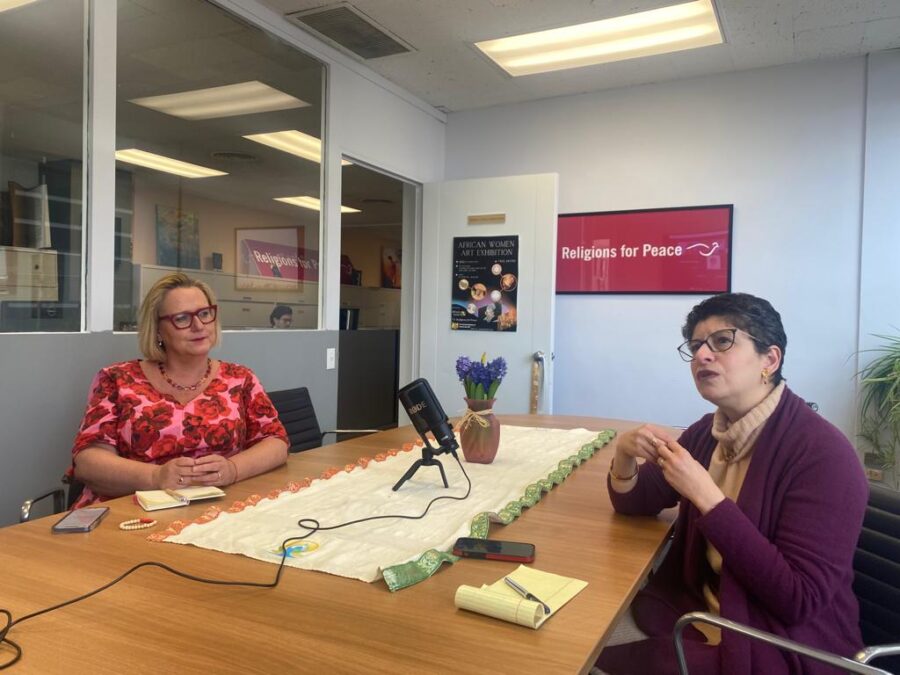Religions for Peace Hosts Fireside Chat with Ms. Katja Iversen
 On 8 February, Religions for Peace was honoured to welcome Ms. Katja Iversen, award-winning executive adviser, author, and global advocate on sustainability, purpose-driven leadership, global health, diversity, and well-being economy. Through a fireside chat moderated by Prof. Azza Karam, Secretary General of Religions for Peace, members of theReligions for Peace global movement heard from Ms. Iversen’s expert perspectives on a wide range of topics, including the interlinkages between multi-religious cooperation and multilateralism, engaging with gender equality and women’s issues outside of the Western world, and the unique position of Religions for Peace as the convenor of vital actors addressing the “polycrisis” (climate change, conflict, cost of living, growing in-equalities, biodiversity loss, public health emergencies, and democratic regression, just to name a few) that threatens all of humanity, as well as the planet.
On 8 February, Religions for Peace was honoured to welcome Ms. Katja Iversen, award-winning executive adviser, author, and global advocate on sustainability, purpose-driven leadership, global health, diversity, and well-being economy. Through a fireside chat moderated by Prof. Azza Karam, Secretary General of Religions for Peace, members of theReligions for Peace global movement heard from Ms. Iversen’s expert perspectives on a wide range of topics, including the interlinkages between multi-religious cooperation and multilateralism, engaging with gender equality and women’s issues outside of the Western world, and the unique position of Religions for Peace as the convenor of vital actors addressing the “polycrisis” (climate change, conflict, cost of living, growing in-equalities, biodiversity loss, public health emergencies, and democratic regression, just to name a few) that threatens all of humanity, as well as the planet.
Recalling her experience during the recent 2023 Annual Meeting of the World Economic Forum in Davos, Switzerland, Ms. Iversen emphasised, “If we want to push for change in the world, we have to go where power is – and Davos is where economic power is gathering.” In her optic, WEF offers a valuable platform not only to interact with powerful people, but also to nudge them to utilise their resources to affect positive change in the world. And it can be done “when you present a combination of facts, figures, stories, and impactful solutions on why and how to make change happen – and when you can do it with a business lens – you will be received with very open ears. It’s the right and the smart thing to do” she noted.
Serving as the Secretary General of the largest multifaith platform in the world, Prof. Karam pointed out that there is, in fact, an urgent need for faith communities to identify better ways to both quantify and disseminate the far-reaching impact of multi-religious cooperation on a wide range of issues. To this end, she sought Ms. Iversen’s wisdom on how best to measure the seemingly unquantifiable impact of faith communities, in order to bridge the gap between the global political and economic space, and the multi-religious space that is rapidly growing and actively engaged in a myriad of issues.
Stressing that advocacy is indeed hard, but not impossible, to measure, Ms. Iversen highlighted that the quantifiable value of the faith communities’ efforts in addressing the world’s maladies together lies in the positive societal impact of such collaborative efforts. She commended the societal gains from the work of Religions for Peace in convening the world’s different religious communities for over 50 years, and called it unique. Regarding the role of women faith leaders, Ms. Iversen pointed to their special ability to translate and interpret the scriptures with a gender lens; challenge systemic failures and address inequalities; shape norms and bust myths with their firsthand knowledge and deep insights into what it means to be a woman in different parts of the world. “With most religions mainly led by men, that perspective and the lived experiences of women are often unrecognised. Women of faith and women faith leaders are bearers and translators of women’s realities on the ground, and this – and they – must be included where decisions are being made and budgets are being allocated.”

Recalling the challenges she encountered as a Westerner engaging with problems that are not necessarily framed the same way in the non-Western world, Dr. Karen Hernandez, Programme Officer for Interreligious Education at Religions for Peace International, posed an important question that many humanitarian practitioners grapple with, “How do we ensure that we are not positing our Western ways of thinking onto non-Western communities, while empowering women and girls to stand up for their rights?”
Reflecting on similar challenges she encountered from addressing women’s issues through the United Nations system, Ms. Iversen stressed the role of language as a key component of efforts aimed at inclusion. In many cases, terminology itself can be exclusionary when the language used is not widely understood by all. Furthermore, she emphasised the importance of deep listening and learning from other people’s perspectives and realities, which she found to be lacking in many development efforts, even those carried out by major humanitarian institutions.
Recognising the importance of listening to one another to identify points of agreement on the central issue at hand, Prof. Karam asked Ms. Iversen what it would take to position women of faith, or faith itself, as a critical component for addressing global issues.
Ms. Iversen lauded Religions for Peace for having already set a global example of positioning women of faith and women faith leaders at the forefront of multi-religious efforts to address some of the world’s most pressing problems. She stressed that extracting the stories, data and societal impact into aspirational messaging – and identifying the most trusted individuals and institutions to promote those messages – are essential to positioning for example Religions for Peace, specific issues and /or women faith leaders in decision-making and agenda-setting processes. “The biggest advantages of Religions for Peace are that it is multi-religious, and that it has had success in convening religious communities to work over many years; the next step is to extract the wins and the impact, as well as data and stories, and present it in ways that touches the heads and hearts, activates the hands, and sometimes opens the wallets,” she noted.
Given the longstanding commitment of Religions for Peace to nurturing a sustainable environment for all, Prof. Karam highlighted that Religions for Peace is planning a series of consultations on sustainability with a human rights lens, where faith communities and global economy-oriented groups will convene to identify points of collaboration and action for sustainability. Ms. Iversen expressed her excitement around such an effort noting with concern the impact of current global crises on the decades’ worth progress on vital issues, citing an example from UN Women, “25 weeks of COVID set back gender equality by 25 years”. Advancing collaborative efforts on sustainability will also help reshape old notions of sustainability from a solely environmental framework to one that embraces both people and planet as reflected in the SDGs. Ms. Iversen emphasised, “We need all hands on deck. The time for action is now. Religions for Peace is uniquely positioned to address the intersections between faith, sustainability, and human rights – and to take it from talk to action”.
In closing, Prof. Karam and Ms. Iversen stressed that the “polycrisis” that humanity faces should not be looked at as a “menu” of issues, from which certain institutions can select a global problem to champion. Instead, it should be regarded as a roadmap, a programme of action, that requires the joint commitment and effort of all sectors – for people, for the planet, and prosperity for all.